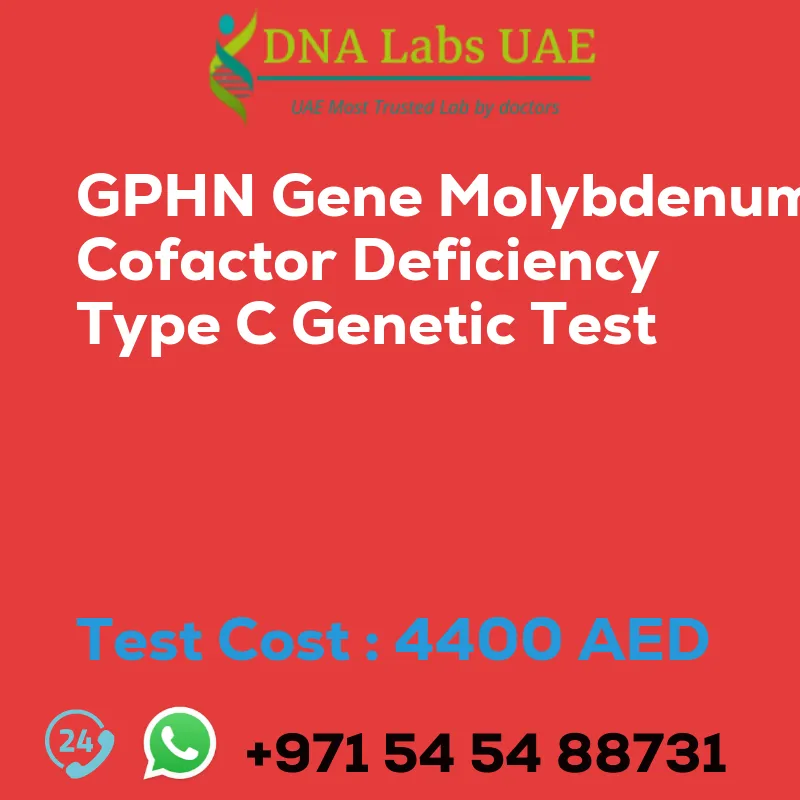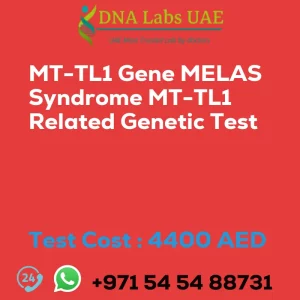GPHN Gene Molybdenum Cofactor Deficiency Type C Genetic Test
At DNA Labs UAE, we offer the GPHN Gene Molybdenum Cofactor Deficiency Type C Genetic Test. This test is used to detect mutations in the GPHN gene, which is responsible for producing a protein called gephyrin. Gephyrin plays a crucial role in the development and functioning of the central nervous system.
Test Components
- Price: 4400.0 AED
Sample Condition
This test requires a blood sample, extracted DNA, or one drop of blood on an FTA card.
Report Delivery
The report will be delivered within 3 to 4 weeks.
Method
This test uses NGS (Next-Generation Sequencing) technology to analyze multiple genes simultaneously and identify any mutations or variations that may be present.
Test Type
This test falls under the category of metabolic disorders.
Doctor
The test can be ordered by a general physician.
Test Department
This test is conducted by our Genetics department.
Pre Test Information
Prior to the test, it is important to provide the clinical history of the patient who is going for the GPHN Gene Molybdenum Cofactor Deficiency Type C NGS Genetic DNA Test. Additionally, a genetic counseling session is recommended to draw a pedigree chart of family members affected by Molybdenum Cofactor Deficiency Type C.
Test Details
Molybdenum Cofactor Deficiency Type C (MoCD type C) is a rare autosomal recessive genetic disorder caused by mutations in the GPHN gene. This gene is responsible for producing the gephyrin protein, which is essential for the proper functioning of the central nervous system.
MoCD type C affects the body’s ability to produce and utilize molybdenum cofactor, a compound necessary for the proper functioning of several enzymes. This deficiency leads to severe neurological symptoms, including seizures, developmental delays, and intellectual disability.
NGS genetic testing is a method used to analyze multiple genes simultaneously and identify any mutations or variations that may be present. In the case of MoCD type C, NGS genetic testing can be used to detect mutations in the GPHN gene, helping to confirm a diagnosis and provide valuable information for genetic counseling and treatment planning.
It is important to note that genetic testing for MoCD type C should be performed by a qualified healthcare professional or genetic counselor who can interpret the results and provide appropriate guidance and support.
| Test Name | GPHN Gene Molybdenum cofactor deficiency type C Genetic Test |
|---|---|
| Components | |
| Price | 4400.0 AED |
| Sample Condition | Blood or Extracted DNA or One drop Blood on FTA Card |
| Report Delivery | 3 to 4 Weeks |
| Method | NGS Technology |
| Test type | Metabolic Disorders |
| Doctor | General Physician |
| Test Department: | Genetics |
| Pre Test Information | Clinical History of Patient who is going for GPHN Gene Molybdenum cofactor deficiency type C NGS Genetic DNA Test A Genetic Counselling session to draw a pedigree chart of family members affected with Molybdenum cofactor deficiency type C |
| Test Details |
The GPHN gene is responsible for producing a protein called gephyrin, which plays a crucial role in the development and functioning of the central nervous system. Mutations in the GPHN gene can lead to a rare genetic disorder known as molybdenum cofactor deficiency type C (MoCD type C). MoCD type C is an autosomal recessive disorder that affects the body’s ability to produce and utilize molybdenum cofactor, an essential compound required for the proper functioning of several enzymes. This deficiency leads to severe neurological symptoms, including seizures, developmental delays, and intellectual disability. NGS (Next-Generation Sequencing) genetic testing is a method used to analyze multiple genes simultaneously and identify any mutations or variations that may be present. In the case of MoCD type C, NGS genetic testing can be used to detect mutations in the GPHN gene, helping to confirm a diagnosis and provide valuable information for genetic counseling and treatment planning. It’s important to note that genetic testing for MoCD type C should be performed by a qualified healthcare professional or genetic counselor who can interpret the results and provide appropriate guidance and support. |








